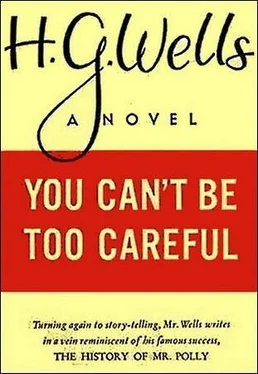H. Wells - You Can't Be Too Careful
Здесь есть возможность читать онлайн «H. Wells - You Can't Be Too Careful» весь текст электронной книги совершенно бесплатно (целиком полную версию без сокращений). В некоторых случаях можно слушать аудио, скачать через торрент в формате fb2 и присутствует краткое содержание. Жанр: Классическая проза, на английском языке. Описание произведения, (предисловие) а так же отзывы посетителей доступны на портале библиотеки ЛибКат.
- Название:You Can't Be Too Careful
- Автор:
- Жанр:
- Год:неизвестен
- ISBN:нет данных
- Рейтинг книги:4 / 5. Голосов: 1
-
Избранное:Добавить в избранное
- Отзывы:
-
Ваша оценка:
- 80
- 1
- 2
- 3
- 4
- 5
You Can't Be Too Careful: краткое содержание, описание и аннотация
Предлагаем к чтению аннотацию, описание, краткое содержание или предисловие (зависит от того, что написал сам автор книги «You Can't Be Too Careful»). Если вы не нашли необходимую информацию о книге — напишите в комментариях, мы постараемся отыскать её.
You Can't Be Too Careful — читать онлайн бесплатно полную книгу (весь текст) целиком
Ниже представлен текст книги, разбитый по страницам. Система сохранения места последней прочитанной страницы, позволяет с удобством читать онлайн бесплатно книгу «You Can't Be Too Careful», без необходимости каждый раз заново искать на чём Вы остановились. Поставьте закладку, и сможете в любой момент перейти на страницу, на которой закончили чтение.
Интервал:
Закладка:
Even in the days before Constantine the Great, when a definite Credo became a plain necessity to substantiate the bargain between Church and State, Christian controversy was chiefly internecine. There was no definite arraignment of the new teaching from any of the philosophical teachers of the schools of Alexandria or the University of Athens, in spite of the provocative snarls of such Christians as Tertullian. They did not think that there was anything in Christianity worthy of argument. Down the ages the typical source of trouble has been the undistinguished man within the Church reading the Scriptures and irritated by the assumptions and interferences of his superiors. He made trouble because he wanted to make trouble. And to-day now more than ever a collapse behind this formidable facade of Catholicism is possible. The Church may feel a chill of doubt about the future and take to professing liberal and democratic ideals, and that may liberate a number of smouldering recalcitrants grimly determined to make their ecclesiastical superiors mean what they say.
Another thing that may weaken this still arrogant opposition to any release of sapiens may be a great social and monetary storm that will Wash away its financial foundations. Priests out of work can forget their sacred calling and authority with remarkable rapidity. They are, as a class, soft-handed and sedentary, and it is possible that many of the younger ones may be interested and reconditioned for educational work. Throughout the social fabric the work of the essential revolution is not a simple implacable conflict but rather a miscellaneous release and reorientation.
We are dealing here with a number of factors whose force and relative importance are practically incalculable. From them there may or may not emerge a federated world, a common fundamental law, an economically unified planet, an organised and properly implemented world education. But until Homo Tewler has got thus far in the balance and control of his incoherent resistances and egotisms, it is preposterous, it is ridiculous, to call him Homo sapiens. That is simply flattering a disagreeable and suicidally backward animal to its own extermination.
II. Philosophical-Theological
And now for a philosophical-theological interlude. Some sort of promise was made in the Introduction to avoid “Ideers .” In spirit, if not to the letter, this promise has been kept. I have done my best to keep to simple, straightforward description, but one thing has led to another; it was less and less possible to keep the background out of the picture if the story was to remain permanently comprehensible. And even at this point there still remain issues that have been raised without deliberate malice, but which must be dealt with, if this account is to be really complete.
But be it noted that from first to last my method has been descriptive. Not one single “Ideer” of my own has been thrust upon the reader. He has not been put upon. I have observed. I have recorded. Simply.
In the preceding chapter, for example, as part of that description, the declaration comes out simply and necessarily that there can be only one philosophy and only one religion in a civilised world order. There may be readers who will be disposed to regard this as an opinion rather than a statement of fact. They will murmur such names as Hegel, Schopenhauer, Nietzsche, William James, Bergson, Maritain, Santayana, Croce, Pavlov, Russell, the Behaviourists and so forth and so on. They will wave towards a vast literature of commentary, over-elaboration, misrepresentation and the like. But if they will, come and stand a little aloof in an attitude of entirely disrespectful attention, they will begin to realise how much of this cerebration is as superfluous as the caps, gowns, titles, ceremonies and pretensions with which it is associated. Let us blow away what we can of this almost overwhelming froth and s^e whether there really is at bottom more than one philosophical reality for the purposes and within the limitations of Homo sapiens.
People who, like Edward Albert, have grown up in an atmosphere of unqualified partisan monotheism in which God is, so to speak, everything; originating and sustaining everything and accounting for everything, have scarcely a suspicion of the immense unsoundness of this-assumption. It is not even justified by Holy Scripture. Therein it is plainly admitted that the whole religious process arose out of a dual system, -like the Zoroastrian antagonism of Ormazd and his twin brother and undying opponent, Ahriman. Satan confronts God at the outset of the Jewish-Christian story, and has his way with Man, Eden is lost and God’s goodness is defeated. God is exasperated and takes it out of Man. Read your Bible. Only gradually does the story weaken down to a predestinate servitude to an invincible Deity. Islam, Judaism, Christianity, are all, so to speak, apostate dualisms that have taken sides and declared outright for one Supreme Being, and a very large part of the philosophical turmoil of the past two hundred years has been a confused return first to an essential and incurable dualism and then, going further, to a polytheistic universe, after the long predominance of one unlimited god,
Yet from the formulation of the so-called Apostles’ Creed onward, there have been signs of an uneasiness about the soundness of this assertion of omnipotence, betrayals of a feeling on the part of the faithful that perhaps they were professing just a little too much. Throughout the centuries the Church has never desisted completely from explaining the Almighty, just as Stalin for the past score of years has never completely desisted from explaining the Dictatorship of the Proletariat. And for quite parallel reasons any denial of the Dictatorship of God in Christendom or the Dictatorship of the Proletariat in Russia has been discouraged as strenuously as possible—all the more strenuously because they are fundamentally unsound dogmas and cannot stand examination.
Directly the dispassionate student of theology sets out to rescue the idea of God from the partisan extravagances of the pious, it becomes manifest that the idea of His omniscience, omnipresence and omnipotence must be abandoned. These terms are entirely incompatible with the idea of a personal God with whom anyone or anything can have a relationship in time and space, A God who knows everything must be entirely stagnant mentally. How can he think, since everything is there in his mind already? And if he fills all space, then he is fixed for ever. How can he move? He cannot think; he has thought it all; he cannot move; he is there already. And since he is incapable of mental or physical change, then so far from being omnipotent he is powerless, he is fixed rigidly in an everlasting strait-jacket. Theology can only become a science of Godship when it abandons these preposterous absolutes.
But having abandoned these absolutes, the fresh-minded theologian can go on to some very entertaining considerations. According to any intelligent theological teaching, God, in some manner altogether mysterious and incomprehensible, came into Being in time and space, and our universe began. That is beyond understanding. He had withdrawn himself from an inconceivable infinitude in order to have relationships with creatures outside himself. He opened proceedings by saying: *. Let there be light.” And having manifested himself by light, in that moment he must have cast a shadow, coterminous and reciprocal to himself, the anti-God, Satan, his Zoroastrian twin. Before ever he began to knead the red earth into Adam, the opponent was beside him ready to wreck the work. How else could it have been?
Upon this idea Nietzsche seized, and presented the world with a modern version of the Zoroastrian. (He found it more picturesque and impressive to call it in “Old Persian” the the “Zarathustrian” idea.) A lot he knew of Old Persian! Literary artistry, erudition, classical pretentiousness, and a dislike for Jews gave his writing its peculiar qualities. He swallowed Persian dualism uncritically and took the side of Satan, because it was the most emphatic way of repudiatingY the orthodoxies and ungentlemanly beliefs about him. He drew his contrast. God wanted to keep man a naked respectful slave in the Garden of Eden, amidst a great boredom of carnivores and suchlike frustrated creatures. Satan wanted to get him to eat the tree of knowledge and go out into the great world. Eden meant “Safety First”; Satan whispered “Live dangerously.” That was the current of revolt. It was not very original. It followed the drift of the period. There is indeed about one week of clear hard thinking in the whole of the Nietzschean bubble. After that he just blew and blew.
Читать дальшеИнтервал:
Закладка:
Похожие книги на «You Can't Be Too Careful»
Представляем Вашему вниманию похожие книги на «You Can't Be Too Careful» списком для выбора. Мы отобрали схожую по названию и смыслу литературу в надежде предоставить читателям больше вариантов отыскать новые, интересные, ещё непрочитанные произведения.
Обсуждение, отзывы о книге «You Can't Be Too Careful» и просто собственные мнения читателей. Оставьте ваши комментарии, напишите, что Вы думаете о произведении, его смысле или главных героях. Укажите что конкретно понравилось, а что нет, и почему Вы так считаете.












